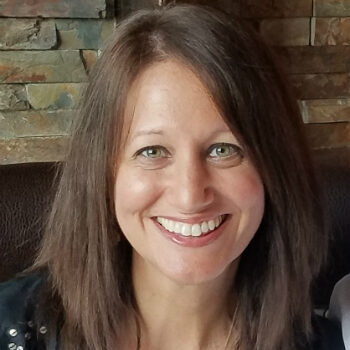Stephanie Sullivan started her career as an attorney. She spent the following ten years as a professional development leader helping lawyers, law students, and recent graduates succeed in their career. Like many returnees, she only expected to take a few years away from her career to raise her daughters. Eleven years later, she re-entered the workforce through the Path Forward program at Verisk Analytics in their HR department. At the end of the program she was hired full-time to be a program manager in talent development where, among other responsibilities, she now oversees their Path Forward program. Here’s her story.
Tell us about the work you do at Verisk. I oversee corporate talent development programs like Path Forward and the company’s Data Science Excellence Program. When I interviewed at Verisk, they really liked my past work with students and new graduates. This position, especially running the new Data Science Excellence Program, really aligned with that.
Did you do anything to keep your skills up to date while you were on a career break? Yes, I completed a Master’s Certification Program in Organizational Leadership, Strategic Innovation and Change, which has helped me at my current role at Verisk.
What has your experience been like as a returnee? Verisk gave me complete oversight of the program I was hired to manage. It was just ideal, as a return internship, to have an impactful role in the program, and knowing that my opinions were valued. The position touched on my background, and I got to use the certification I studied for. I love it.
What skills from your previous work life do you use in your new position? Project management, strategic planning, learning development and training, and student engagement and recruitment, as well as a little bit of legal skills.
What has been one of the more challenging parts of returning to work? Understanding new technologies. I worried I was behind the times, that everything would be virtual, which it is. Thankfully, I think going back to school really helped me adapt. That was a huge benefit, and I highly recommend taking classes for anyone who has been out of work for a while. In addition to the job function knowledge, I gained new technology skills, confidence, and practice interacting with authority. I definitely recommend it.
What has been the most exciting or gratifying part of returning to work? I just love the professional collaboration. I do well working alone, but I also need that team atmosphere. I really do enjoy group collaboration. It was nice to come back into that. I like being a professional. I like going to the office. I have a stronger appreciation for my family. I value my time with my family much more, and they were ready for this change too.
Did anything surprise you about your return to work experience? How ready I was to make the transition back to work. I did not have a single hesitation. I was all in to make it happen!
What are you most proud of accomplishing during your return to work experience? I think I represented myself, and others who have been in my situation, well. Just because I have been out of work does not mean I have lost my knowledge, skills, or professionalism. I proved to others that the gap in my resume did not hurt my ability to achieve what the organization brought me on to do.
What did you find the most helpful about being part of a Path Forward program at your company? The gap in my resume was valued as part of Path Forward and not seen as a negative. It allowed me to get my foot in the door quickly, and prove I could be a positive addition to Verisk. I’m just very grateful. It was a great opportunity for me. I think returning to work in this way is ideal.
What advice would you give future returnees? Whatever the situation, remember to always be professional and stress how dedicated you are to returning to work. Sell all of your past experiences that match the work you could do for the company. Be honest about the challenges, but offer solutions on how you will overcome them, like offer to take a class or shadow a colleague. Be proactive and ready to work hard. Also, while many returnees are extremely qualified and have held successful positions in the past, be humble and open to taking direction as a returnee.
What kind of preparation would you suggest potential returnees do before applying for a return to work internship? Classes or certifications that can get you up to speed on the current environment or industry are a great investment. Being able to talk in present terms about the work and industry, even if you haven’t worked in it recently, will help you. Research the company, its people, its initiatives. That’s all important.
Would you recommend a return to work internship to others who are looking to restart their careers? Absolutely. This type of internship looks directly at that gap in the resume and acknowledges the value of the time spent as a caregiver.
What direction are you hoping to take your career in the years to come? I am thrilled to be on this new professional path. I want to contribute significantly to my organization and I hope to have a solid future in this new stage of my life!
